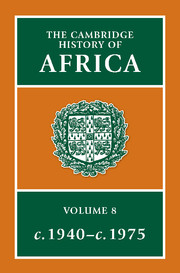Book contents
- Frontmatter
- Introduction
- 1 The Second World War: prelude to decolonisation in Africa
- 2 Decolonisation and the problems of independence
- 3 Pan-Africanism Since 1940
- 4 Social and cultural change
- 5 The economic evolution of developing Africa
- 6 Southern Africa
- 7 English-speaking West Africa
- 8 East and Central Africa
- 9 The Horn of Africa
- 10 Egypt, Libya and the Sudan
- 11 The Maghrib
- 12 French-speaking tropical Africa
- 13 Madagascar
- 14 Zaire, Rwanda and Burundi
- 15 Portuguese-speaking Africa
- Bibliographical essays
- Bibliography
- Index
- References
7 - English-speaking West Africa
Published online by Cambridge University Press: 28 March 2008
- Frontmatter
- Introduction
- 1 The Second World War: prelude to decolonisation in Africa
- 2 Decolonisation and the problems of independence
- 3 Pan-Africanism Since 1940
- 4 Social and cultural change
- 5 The economic evolution of developing Africa
- 6 Southern Africa
- 7 English-speaking West Africa
- 8 East and Central Africa
- 9 The Horn of Africa
- 10 Egypt, Libya and the Sudan
- 11 The Maghrib
- 12 French-speaking tropical Africa
- 13 Madagascar
- 14 Zaire, Rwanda and Burundi
- 15 Portuguese-speaking Africa
- Bibliographical essays
- Bibliography
- Index
- References
Summary
Can the English-speaking countries of West Africa – Nigeria, Ghana, Sierra Leone, Liberia and the Gambia – be considered as a separate group? Apart from Sierra Leone and Liberia they are not contiguous and might seem to have little in common other than their imported official language; even this has very different status among different groups in each country. For the Creoles of Sierra Leone and Liberians of American descent it is their native language; for the Hausa-speaking peoples of Northern Nigeria it takes second place to their own language, reduced to writing long before the advent of the British.
The impact of colonial rule by Britain on its West African colonies was uneven. For some groups, in particular the coastal communities under British rule for over a century, it deeply affected their culture and gave them strong links with others similarly affected elsewhere in West Africa. Even for Americo- Liberians that British connexion was important because of their religious and educational links with Freetown. The real founder of Nigerian political journalism in the 1890s, for instance, was John Payne Jackson, an Americo-Liberian. The number affected by such links, however, was tiny. And in all five countries there have been ‘two nations’: small coastal communities with long connexions with Britain or, in the case of Liberia, America, and much larger communities which came under British rule only at the turn of the century.
- Type
- Chapter
- Information
- The Cambridge History of Africa , pp. 331 - 382Publisher: Cambridge University PressPrint publication year: 1984
References
- 2
- Cited by

